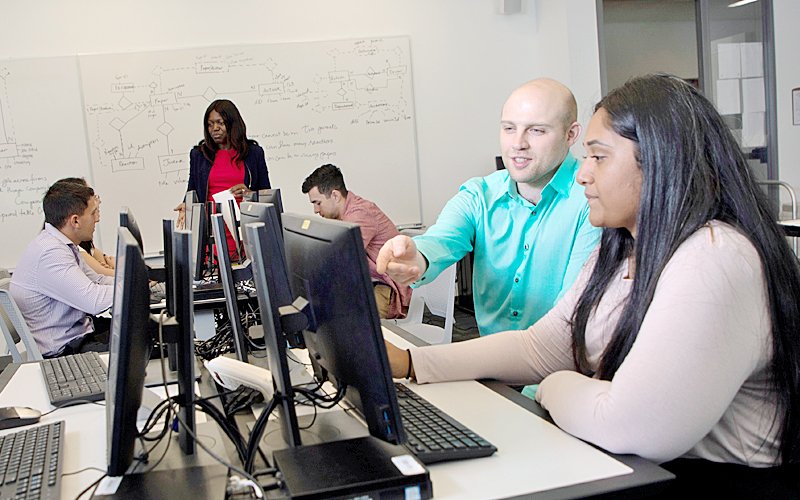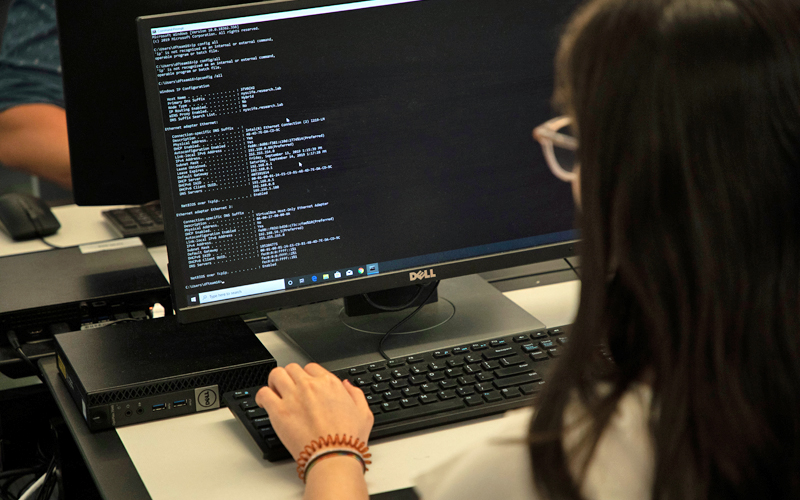New Programs Off to a Strong Start Despite COVID

M.S. Digital Forensics & Cybersecurity and Undergraduate Certificate in Business Analytics
Two highly anticipated information technology-related programs made stunning debuts this fall, with enrollment unhampered by the pandemic. The M.S. Digital Forensics & Cybersecurity attracted students across majors, exceeding their enrollment goal, while the undergraduate Certificate in Business Analytics brings a new opportunity to business students.
These programs expand the extensive technology-related offerings of the School of Business, including the BS in digital forensics, an undergraduate concentration in business analytics, a graduate certificate in information security and MBA concentrations in information systems and business analytics and cybersecurity.
MS Digital Forensics: A Pipeline to Success
The graduate digital forensics program, launched this fall, builds and expands on the success of the undergraduate degree in digital forensics which is NSA accredited as a Center of Excellence in Cyber Defense Education. Both programs were created by the Chair of the Department of Information Security and Digital Forensics Sanjay Goel. “The program fills a huge gap in the supply and demand in the cyber security job market with over a quarter million jobs open in the field in the United States,” said Goel.
Assistant Dean for Graduate Student Services Zina Lawrence is thrilled with the promising beginning. “It was crazy to start a new grad program during COVID, but it worked. Many of the classes were already scheduled to be online,” she said, “though the constraints of the pandemic limited the number of tracks.”
The incoming class comes from a variety of disciplines, including recent graduates from the School of Business and other academic backgrounds such as criminal justice, computer science and homeland security. Approximately 70% of the new class are attending fulltime, while the remaining 30% are working professionals from state agencies, school districts and private industry, taking from one to three classes per semester.
Goel is pleased with the inaugural class. “Due to COVID, we were not able to recruit through the usual recruitment channels. We used our own network, including our Digital Forensics Advisory Board as well as faculty contacts with other universities, to reach students, resulting in strong enrollments for the program,” said Goel. He notes that the curriculum is intense, and the students are challenged, but off to a solid start. “They are immersed in their work, hardworking and happy, with some already beginning internships,” he said.
Several students are supported through a U.S. Department of Commerce Economic Development Administration grant that Goel received to support businesses in the Capital District post Covid-19. Through this program student interns provide information security, technology, and innovation support to Capital Region businesses. See story.
Lawrence is especially impressed with the dedication of the School of Business Digital Forensics Advisory Board. “They are not an afterthought. The board has input into curriculum design. They guest lecture, support student clubs, fund scholarships, provide internships and offer jobs. They are 100% behind the success of our programs and our students,” she said.
One board member, alumna Deb Snyder, who recently retired from her role as New York State’s chief information security officer, has already introduced a new class into the curriculum. She teaches “Managing Cyber Information.”
The department has been hosting job fairs supported by the Advisory Board in the fall and spring of each semester since spring of 2018 – this year the cyber jobs fair goes cyber. Students will meet with employers virtually through Zoom. Instead of walking from table to table, they will move from session to session with the opportunity for one-to-one conversations with the recruiters.
The program currently offers a track in cyber security, with two tracks to be added in the future as the program grows. The track in cyber security focuses on cyber incident investigation, preparing students for work in public and private sectors. Digital forensics grads will work in forensic laboratories and other law enforcement work after learning how to extract, analyze and sanitize data from digital devices and protect systems against threats. The third track, cyber operations, offers instruction in threat detection. Graduates who have earned that track are expected to work in intelligence agencies and consulting firms.
Certificate in Business Analytics: Meeting the Needs of Industry
The increasing demand for graduates with data management skills has led to the creation of an undergraduate certificate in business analytics. The focus is applied analytics and teaches data extraction and analysis. Classes in data modeling and extraction combine with classes in quantitative analysis broaden the skillset of School of Business students. It is the first undergraduate certificate offered by UAlbany.
All aspects of business analytics are covered, including business intelligence, data curation and data mining. Students become skilled at creating systems and data collection processes that allow organizations to effectively use data and quantitative models to solve critical business problems and take advantage of new business opportunities.
Students are empowered with the knowledge and ability to analyze, design and deploy digital systems to extract insights from data through descriptive and predictive analytics, and use those insights to make strategic business decisions, enhance customer value and increase profitability.
The new courses include industry-standard tools to improve the marketability of graduates. Information Systems and Business Analytics department efforts include development of micro-credentials, starting with Tableau, an analytic and business intelligence platform.
“Information systems have moved from operationalization of processes to creation of business value. Our alumni tell us that students are now expected to create dashboards and visualizations. They need to apply the latest techniques to curate, combine, and store data from traditional databases, clickstreams, and usage patterns. Even entry level employees are using and developing bots to automate processes. All of these technologies cry out for specialized and focused instruction in analytics,” said ISBA Chair Eliot Rich.



